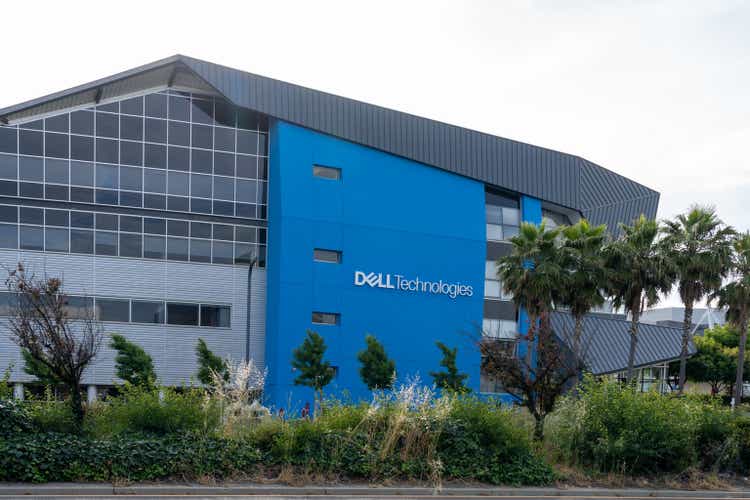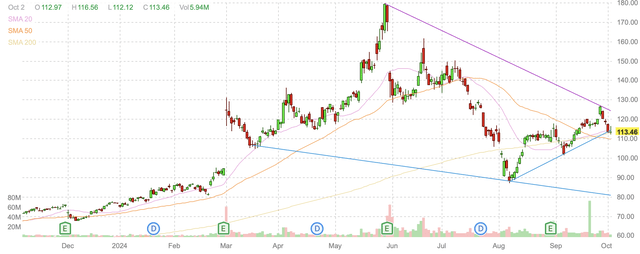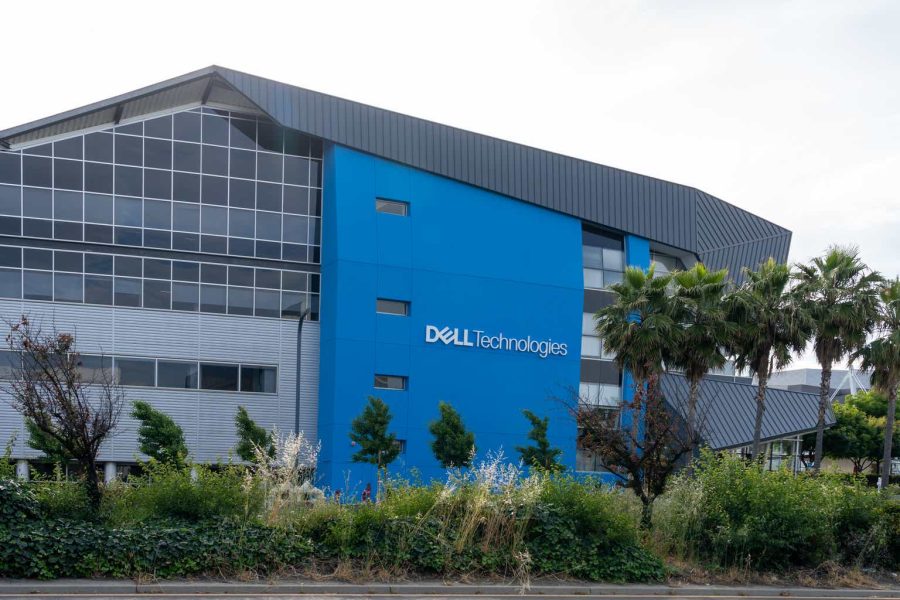Summary:
- Dell Technologies is a strong investment choice due to its AI server sales growth, reasonable valuation, and low downside risk.
- Dell’s AI server sales exceeded expectations, driving a 9% total revenue increase, despite a 4% decline in PC sales.
- Dell’s current P/E ratio is significantly lower than other AI beneficiaries, suggesting potential for price appreciation and a target price range of $124-$144.
- Dell’s dividend yield of 1.57% is well-covered, with potential for future increases, providing additional investor value and margin of safety.

JHVEPhoto
Dell Technologies (NYSE:DELL) is on the short list of companies that are both likely beneficiaries of the continuing wave of growth in AI server development and yet not clearly overvalued. As a result, Dell appears to be a reasonable investment choice for continued AI sales growth without a significant level of downside risk.
Dell has performed well this year and largely due to revenue related to AI server related hardware. Dell’s AI server sales came in at $3.1 billion, last quarter, which was about $700 million better than expectations. Dell’s servers, networking, and storage sales came in nearly 40 percent above last year’s revenue, while its PC sales business came in slightly below expectations. The company’s total revenue increased about nine percent versus the same quarter a year earlier. Storage was also reasonably strong, and contributed to the beat that was mostly fueled by demand for AI server hardware.
Dell’s PC sales declined by four percent compared to the same quarter last year. It is possible that there is a delay in some PC upgrading in anticipation of new systems and hardware that better integrate AI will come to market next year. If this ends up being the case, Dell may realize growth in the coming quarters on a new cycle of upgrading PCs. Dell is also maintaining its server margins, which indicates that it is not resorting to significant discounting in an effort to win contracts from the large entities building AI data centers. Dell’s margins in 2024 have come in at 24 percent, which is reasonably strong for this competitive business.
I expect Dell’s margins to slightly contract in 2025, and potentially down to 22 or 23 percent, due to negotiated pricing with the large entities fueling AI server demand, as well as potential discounting due to increased competition and supply. Some such discounting may be countered by cost reductions on various components within servers and data centers, which may allow Dell to maintain its margins, but which could also result in larger price reductions.
While Dell last reported relatively flat numbers for its backlog of business, it is still likely that its revenue can grow seven to ten percent in 2025 and potentially beyond. This range is at least partially due to the lack of clarity in the extent of a forthcoming PC refresh cycle in 2025 and 2026. Dell has about 15 percent of the PC market.
Compared to most companies benefitting from AI server demand, Dell trades at a substantially lower value. According to Seeking Alpha’s valuation data, Dell’s current P/E is 15.87 and its forward P/E is 14.39. This valuation is below the S&P 500’s P/E and also well below other AI related beneficiaries, such as Vertiv Holdings (VRT) (38.29 current / 30.13 forward), NVIDIA (NVDA) (90.28 current / 41.19 forward), and Microsoft (MSFT) (35.65 current / 31.99 forward).
I believe it is reasonable to expect Dell’s P/E to remain below these above-mentioned entities, but that its P/E should be in the 16-17x range and a forward P/E of 15-16x. Based upon estimated 2025 earnings of $7.75 and potential 2026 earnings of above $9 per share. This results in a target price range of $124-$144, which averages to $134.
Further, this target could require raising if a PC refresh cycle kicks in and Dell proves to be a substantial beneficiary. Another possibility is that Dell ends up using free cash flow to repurchase shares, which would result in an increased EPS. If 2026’s target EPS were to increase to $9.50, that would result in an $7.50 to $8 increase in the 12-month price target based upon forward P/E, and a target price range in the mid $140s to low $150s.
I believe the above numbers are reasonable valuations for Dell and represent an attempt to find a fair value for the company. Dell’s potential trading price could easily surpass such targets if the market continues to prefer AI revenue, or if demand for AI servers and data centers grows beyond expectations in 2025 and 2026. Dell could also benefit from growing its backlog in the coming quarters, after it remains relatively flat.
Dell peaked at the end of May in the low $180s. Dell then entered a downtrend that reached its bottom along with the broader market at the start of August. Dell is still about 36 percent below its 2024 high. More recently and especially since reporting its last quarterly earnings on August 29, Dell has acted reasonably well. Shares did bounce off of apparent resistance in the mid $120s and have since been in a reasonably tight trading range.

DELL daily candlestick chart (FINVIZ.com)
Moreover, Dell shares have been making a series of higher lows, including appearing to be making one currently. Further, Dell’s share price is sitting just above its 20, 50, and 200 day simple moving averages (“SMAs”). As a result, I believe this pricing should to act as strong support, and shares have a reasonably strong likelihood of making another move towards apparent resistance in the low to mid $120s. It is also possible that shares will continue to coil in a tightening trading range, but Dell appears likely to eventually break out of this range to the upside.
Dell also pays a dividend. Its current yield is about 1.57 percent. The dividend is exceptionally well covered, with a 22.51 percent payout ratio. This also means that Dell has the capacity to increase the dividend in coming quarters and years. Dell only started paying a dividend in 2022, but did increase the dividend in 2023 and 2024. In February of this year, Dell increased its annual total dividend by 20 percent. It could end up being that Dell will again increase its dividend in February of next year, but that is speculative at this point.
Risks
The primary risk to Dell is that it is unable to continue to capitalize on AI server and data center demand. Further, the AI server market is dominated by large and highly competitive companies (“hyperscalers”) that could pressure Dell and other suppliers to reduce their margins in order to obtain and/or maintain their business.
Another risk is that the PC refresh cycle is weak due to a lack of demand, or a lack of need. Weak demand could be due to a recession or a general reduction in the buying power of individuals and small companies to upgrade into new hardware. A lack of need could be due to AI capacities being delivered through the cloud in a manner that does not require upgrading existing PCs.
Conclusion
Dell trades at a fair value and offers a reasonable margin of safety due to its low P/E ratio and dividend, as well as the potential for that dividend to increase. Dell bottomed this summer, and has been performing reasonably well since reporting earnings in August, with shares putting in a higher high and a higher low. Dell shares are now sitting at apparent support, and just above its 20, 50, and 200 day SMAs. As a result, it appears likely that Dell will make another near term move up in price and attempt to break out of apparent resistance in the low to mid $120s.
Analyst’s Disclosure: I/we have a beneficial long position in the shares of DELL either through stock ownership, options, or other derivatives. I wrote this article myself, and it expresses my own opinions. I am not receiving compensation for it (other than from Seeking Alpha). I have no business relationship with any company whose stock is mentioned in this article.
Seeking Alpha’s Disclosure: Past performance is no guarantee of future results. No recommendation or advice is being given as to whether any investment is suitable for a particular investor. Any views or opinions expressed above may not reflect those of Seeking Alpha as a whole. Seeking Alpha is not a licensed securities dealer, broker or US investment adviser or investment bank. Our analysts are third party authors that include both professional investors and individual investors who may not be licensed or certified by any institute or regulatory body.
